#b2b content marketing
Text
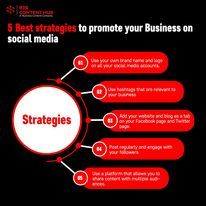
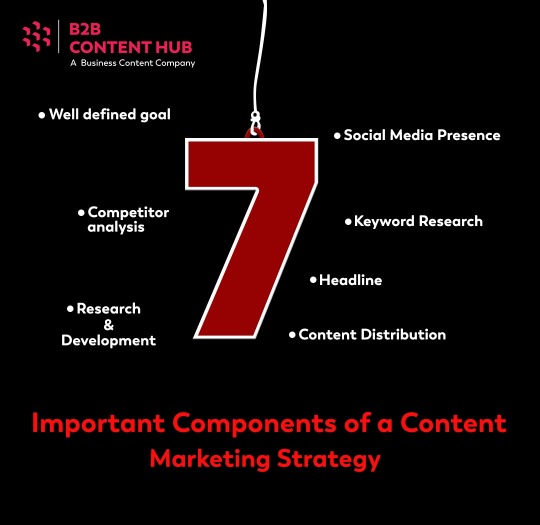
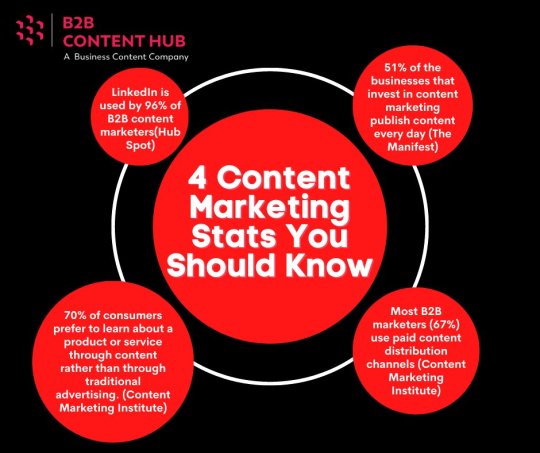
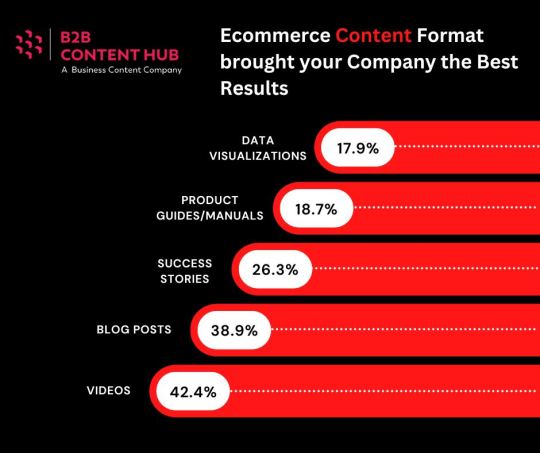
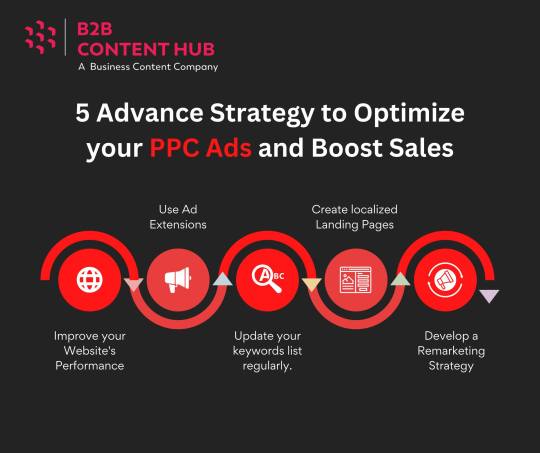
#b2bcontent#b2b content marketing#business content#all in one digital content#content marketing strategy#content marketing#advantages of content marketing#content marketing and sales
2 notes
·
View notes
Text
I will provide you high quality niche targeted lead or email list
https://bit.ly/3xFYHNU

https://bit.ly/3xFYHNU
#shishirsutradhar#shishir#anik#shishiranik#shishirsd#lead generation#b2b lead generation#b2b content marketing#email list#email marketing
8 notes
·
View notes
Text

10 B2B Marketing Trends to Watch in 2023" by MarketingProfs
In today's highly competitive business environment, companies must keep up with the latest trends in B2B marketing to stay ahead of the curve. As we move into 2023, there are ten key trends that businesses should keep an eye on, according to MarketingProfs.
Personalization: Customers expect personalized experiences, and B2B companies are no exception. In 2023, we'll see an even greater emphasis on personalization in B2B marketing, with businesses using data to tailor their messaging to individual customers.
AI and machine learning: As AI and machine learning continue to evolve, they will play an increasingly important role in B2B marketing. From predictive analytics to chatbots, businesses will use these technologies to deliver more personalized and efficient experiences to customers.
Account-based marketing: Account-based marketing (ABM) has been around for a few years, but it's still gaining momentum. In 2023, we'll see more companies adopt ABM strategies, which involve targeting specific accounts rather than casting a wide net.
Influencer marketing: Influencer marketing has traditionally been associated with B2C marketing, but in 2023, we'll see more B2B companies using influencers to promote their products and services.
Video marketing: Video marketing has been on the rise for several years, but in 2023, it will become even more important. With the rise of platforms like TikTok and Instagram Reels, businesses will need to create short, engaging videos to capture the attention of their audience.
Virtual and hybrid events: The COVID-19 pandemic has forced many businesses to pivot to virtual events, but even as the pandemic wanes, virtual and hybrid events will continue to play a significant role in B2B marketing.
Customer experience: Customer experience has always been important, but in 2023, it will be even more critical. B2B companies will need to focus on delivering exceptional customer experiences to stay competitive.
Sustainability: Sustainability is becoming an increasingly important issue for consumers and businesses alike. In 2023, B2B companies will need to demonstrate their commitment to sustainability through their marketing efforts.
Voice search: With the rise of smart speakers and voice assistants, voice search is becoming more prevalent. B2B companies will need to optimize their content for voice search to ensure they're visible to potential customers.
Social media: Social media has been a key part of B2B marketing for several years, and in 2023, it will continue to be important. However, businesses will need to adapt to new platforms and features to stay relevant.
In conclusion, these ten trends will shape the landscape of B2B marketing in 2023. To stay competitive, businesses will need to embrace these trends and find innovative ways to incorporate them into their marketing strategies. By doing so, they'll be well-positioned to succeed in an ever-changing business environment.
#b2bleads#b2bsolutions#promilo#b2b demand generation#b2b portal#b2b#b2b saas#education#b2b content marketing
1 note
·
View note
Text
Mastering Branding: Essential Strategies for Building a Powerful Brand Identity
If you want to take your business to the next level and stand out from the competition, mastering branding is essential. Your brand identity is the heart and soul of your business – it's what differentiates you from others and helps you connect with your target audience on a deeper level. In this article, we will explore some key strategies b2b tech digital marketing agency that will help you build a powerful brand identity that resonates with your customers.

What is Branding?
Branding goes beyond just a logo or a catchy slogan – it's the perception that people have of your business. It encompasses everything from your company's values and mission to the way you communicate with your customers. Effective branding creates an emotional connection with your audience, instilling trust and loyalty.
Why is Branding Important?
Branding is crucial for several reasons. Firstly, it helps you establish a unique identity in the market, making it easier for customers to recognize and remember your business. Secondly, a strong brand can command higher prices and create a sense of trust and credibility among consumers. Finally, branding can also attract top talent and create a sense of pride and belonging among employees.
Essential Strategies for Building a Powerful Brand Identity
Define Your Brand: Start by clearly defining your brand's values, mission, and personality. What do you stand for, and what sets you apart from your competitors? This will serve as the foundation for all your branding efforts.
Know Your Audience: Understanding your target audience is key to creating a brand that resonates with them. Conduct market research to gather insights into their needs, preferences, and behaviors.
Consistent Branding: Consistency is key when it comes to branding. Ensure that your brand's visuals, messaging, and tone of voice are consistent across all touchpoints, from your website to your social media accounts.
Tell Your Story: Your brand's story is what sets you apart and makes you memorable. Use storytelling to connect with your audience on an emotional level and create a lasting impression.
Build Brand Partnerships: Collaborating with other brands can help you reach new audiences and strengthen your brand's credibility. Look for partnerships that align with your values and can enhance your brand identity.
Monitor and Adapt: Branding is an ongoing process, so it's essential to monitor how your brand is perceived and make adjustments as needed. Stay up to date with industry trends and customer feedback to keep your brand relevant.
Conclusion
In conclusion, mastering branding is crucial for building a powerful brand identity that resonates with your target audience. By defining your brand, knowing your audience, maintaining consistency, telling your story, building partnerships, and continuously adapting, you can create a brand that sets you apart from the competition and leaves a lasting impression. Remember that branding is not just about logos and colors – it's about building a meaningful connection with your customers. So, start implementing these essential strategies today and watch your brand identity soar to new heights!
Remember, the key to successful branding is understanding your brand's values, knowing your audience, and maintaining consistency. By following these essential strategies, you can build a powerful brand identity that sets you apart and resonates with your customers. So, what are you waiting for? Start mastering your branding today and watch your business grow!
FAQ
Why is B2B Tech Digital Marketing Important?
In today's digital world, having a strong online presence is essential for B2B companies to reach their target audience. B2B digital marketing London allows businesses to connect with potential clients, generate leads, and ultimately drive sales.
What are the Key Components of a Successful B2B Tech Digital Marketing Strategy?
A successful B2B tech digital marketing strategy should include a mix of tactics to reach and engage potential clients effectively. Key components may include:
Content Marketing: Creating valuable and relevant content to attract and educate prospects.
Email Marketing: Building relationships with leads through targeted email campaigns.
Social Media Advertising: Promoting products and services on platforms like LinkedIn and Twitter.
Search Engine Optimization: Optimizing website content to rank higher in search engine results.
How Can B2B Tech Companies Measure the Success of their Digital Marketing Efforts?
Measuring the success of B2B tech digital marketing efforts is crucial to understanding what is working and what isn't. Key performance indicators (KPIs) such as website traffic, conversion rates, and lead generation can help companies track and optimize the effectiveness of their campaigns.
What are the Latest Trends in B2B Tech Digital Marketing?
As technology evolves, so do digital marketing trends. Some of the latest trends in B2B tech digital marketing include:
Account-Based Marketing (ABM): Targeting specific accounts with personalized marketing campaigns.
Artificial Intelligence (AI): Utilizing AI-powered tools to improve marketing efficiency and personalization.
Video Marketing: Engaging prospects with interactive video content.
Voice Search Optimization: Optimizing content for voice search queries.
1 note
·
View note
Text
Unlocking the Power of Employee Feedback Loops in Shaping Internal Marketing Campaigns
An employee feedback loop is a two-way communication system between workers and leadership. Ideally, it is open, and staff can go to management without fear of retribution for expressing concerns. How a company communicates with its people can build a solid and authentic relationship.
Internal marketing should build morale and help staff see the benefits of working for the company. Ideally,…

View On WordPress
#b2b content marketing#business advice tips#Content Marketing#Employee Feedback Loops#Internal Marketing Campaigns#small business advices#small business tips#Unlocking the Power of Employee Feedback Loops in Shaping Internal Marketing Campaigns
0 notes
Text
Achieving Success: Organizational Goals for B2B Content Marketing

Description:
In the competitive landscape of B2B marketing, content serves as a powerful tool to achieve various organizational goals. From lead generation to customer retention, strategic content marketing can drive growth and success for businesses. Explore the key objectives below:
1. Lead Generation:
By creating valuable and relevant content, businesses can attract potential leads and nurture them through the sales funnel.
2. Sales:
Compelling content can influence purchasing decisions, driving sales and revenue growth for B2B companies.
3. Lead Nurturing:
Content helps in building relationships with leads over time, guiding them through the buying process, and converting them into customers.
4. Brand Awareness:
Consistent and high-quality content increases brand visibility and recognition within the target market.
5. Engagement:
Engaging content encourages interaction and participation from the audience, fostering stronger connections and brand loyalty.
6. Customer Retention/Loyalty:
Content tailored to existing customers can enhance satisfaction, loyalty, and advocacy, leading to long-term relationships.
7. Upsell/Cross-sell:
Through strategic content marketing, businesses can promote additional products or services to existing customers, driving upsell and cross-sell opportunities.
Conclusion:
Incorporating B2B content marketing into your overall strategy is essential for achieving organizational goals and driving business growth. By focusing on lead generation, sales, lead nurturing, brand awareness, engagement, customer retention/loyalty, and upsell/cross-sell, businesses can create meaningful connections with their audience, increase revenue, and establish themselves as industry leaders. Embrace the power of content marketing to elevate your brand and achieve success in the competitive B2B landscape.
#B2B landscape#b2b content marketing#content marketing#B2B companies#b2b lead generation#lead generation#b2b marketing#b2b marketing strategy#b2bmarketing#b2bindemand#leadgeneration#b2b services#marketingstrategy
1 note
·
View note
Text
#digital marketing#landingpages#b2b#b2bmarketing#b2b content marketing#b2b services#marketingstrategy
0 notes
Text
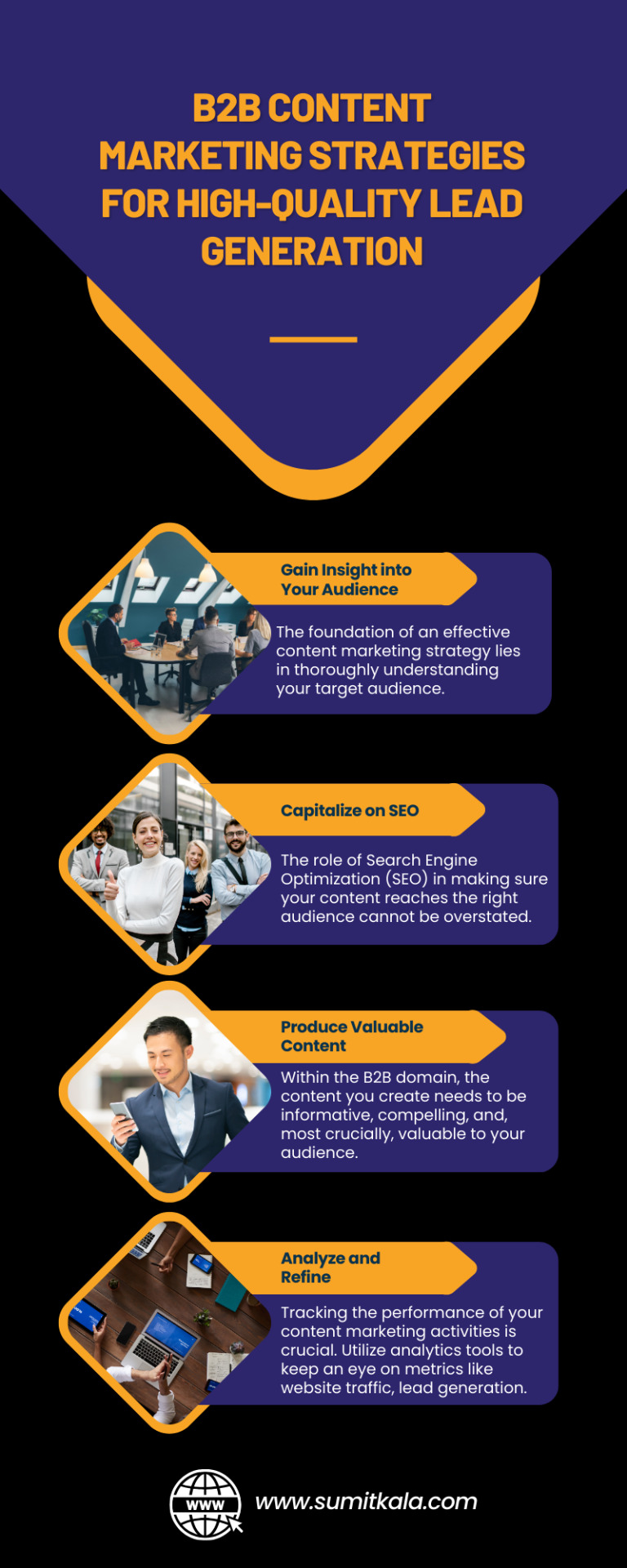
In today’s dynamic digital marketing environment, B2B content marketing stands out as a critical strategy for businesses focused on generating high-quality leads.
0 notes
Text
How can B2B companies use webinars and whitepapers to generate leads?
B2B companies can effectively use webinars and whitepapers as powerful lead-generation strategies.
In fact, these two forms of content marketing offer unique opportunities to engage with potential customers and establish credibility in the industry.
Let's dive deeper into how each of these strategies can be leveraged to generate high-quality leads.
Webinars:
Webinars, or online seminars, are an excellent way for B2B companies to showcase their expertise and provide valuable insights to their target audience.
By hosting a webinar, companies can position themselves as thought leaders and establish trust with potential customers.
Do you know? -“78% of marketers report that webinars helped lower their cost per lead [more cost-effective]” – BlueJeans by Verizon Report
Here's how B2B companies can use webinars for lead generation:
1. Choose a relevant topic:
Select a topic that aligns with your target audience's pain points and interests. This will attract the right attendees and increase your chances of generating qualified leads.
2. Promote your webinar:
Use various marketing channels, such as email marketing, social media, and your website, to spread the word about your upcoming webinar.
Encourage people to register by highlighting the value they will gain from attending.
3. Create compelling content:
Develop a well-structured and engaging presentation that provides practical solutions and actionable takeaways for your audience.
Use visuals, case studies, and real-life examples to support your points.
4. Collect attendee information:
During the registration process, ask for attendees' contact information, such as name, email address, and company details [optional].
This will enable you to follow up with them after the webinar.
5. Engage with attendees during the webinar:
Encourage interaction by allowing attendees to ask questions or participate in polls.
This creates a more personalized experience and helps build relationships with potential leads.
6. Follow up after the webinar:
Send a thank-you email to all attendees, providing them with a link to access the recorded webinar and any additional resources mentioned during the session.
This is also an opportunity to nurture leads by offering further assistance or providing relevant content.
“You can market your webinar in numerous ways before it takes place, but email marketing and social media tend to be best when you're looking to generate leads and registrations” – MarketingProfs
Whitepapers:
Whitepapers are comprehensive reports or guides that delve deep into a specific industry topic or problem. They serve as valuable resources for B2B buyers who are seeking in-depth information before making purchasing decisions.
Here's how B2B companies can effectively use whitepapers for lead generation:
1. Identify a relevant topic:
Research your target audience's pain points and select a topic that addresses their needs or challenges.
Ensure that your whitepaper provides unique insights and offers practical solutions.
2. Design an attractive landing page:
Create a dedicated landing page for your whitepaper, highlighting its value proposition and benefits.
Include a clear call-to-action (CTA) that encourages visitors to provide their contact information in exchange for downloading the whitepaper.
3. Optimize for search engines:
Use relevant keywords in your whitepaper title, description, and throughout the content to improve its visibility in search engine results. This will drive organic traffic to your landing page.
“SEO experts ranked Organic Search as the #1 lead generation channel for 2022, while leaders ranked Paid Search as the #1 lead generation channel for 2022” – SEO Trends & Predictions for 2023 Report by Conductor
4. Provide valuable content:
Make sure your whitepaper is well-researched, informative, and easy to read. Use clear headings, subheadings, and bullet points to break down complex information.
5. Gate your whitepaper:
Require visitors to fill out a lead capture form before they can access the whitepaper.
Ask for their name, email address, company details, and any other relevant information that can help qualify leads.
6. Nurture leads with follow-up emails:
Once visitors have downloaded your whitepaper, follow up with a series of emails that provide additional insights or related content.
This will keep your brand top-of-mind and help move leads further along the customer journey.
Pro-Tip:
"AI drastically reduces the time marketing and sales teams spend on lead generation. AI can gather customer data, create customer profiles, and generate a contact list of potential customers most likely to make a purchase" – HubSpot
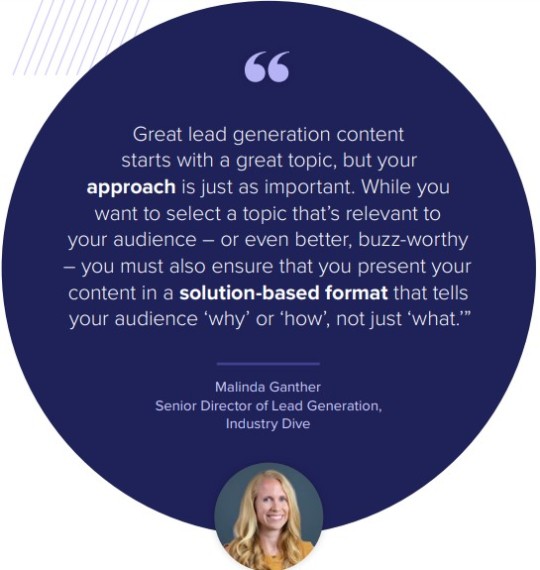
In conclusion, B2B companies can harness the power of webinars and whitepapers as dynamic strategies in their lead generation arsenal.
By leveraging the educational and informative nature of webinars and the in-depth insights offered by whitepapers, businesses can establish authority in their industry, capture valuable leads, and nurture lasting relationships with potential clients.
These versatile strategies not only showcase expertise but also provide tangible value to the audience, making them essential assets for driving growth and success in the B2B digital landscape.
Here's related information that you may also find helpful – B2B Marketing Statistics [Data-Driven Business Success].
#b2b leads#b2b content marketing#b2b marketing#b2b lead generation#b2b#lead generation#digital marketing
0 notes
Text
Kalpins is a leading B2B content marketing agency based in Raleigh, North Carolina. With a team of experienced content writers, strategists, and marketers, Kalpins helps businesses across industries to effectively communicate their brand message, connect with their target audience, and drive growth.
Kalpins understands that B2B content marketing is not just about producing high-quality content, but also about creating a comprehensive strategy that aligns with a company's overall goals and objectives. That's why they work closely with clients to develop custom content marketing plans that are tailored to their specific needs and target audience.
Their content marketing services include content strategy development, content creation, content distribution, and performance analysis. From blog posts and white papers to social media content and email marketing campaigns, Kalpins can help businesses create compelling content that resonates with their audience and drives results.
With a focus on quality and results, Kalpins has established itself as a trusted partner for B2B content marketing in Raleigh, North Carolina, and beyond. Whether you are a small business or a large enterprise, Kalpins can help you leverage the power of content marketing to grow your brand and drive success.
0 notes
Text
B2B müşteri nasıl bulunur?
B2B müşteri, yani işletmeler arası müşteri, şirketlerin başka şirketlere ürün veya hizmet satması anlamına gelir. B2B müşteri segmentasyonu ise, hedef kitle analizi ile birlikte, şirketlerin doğru müşteri kitlesine ulaşabilmesi için önemli bir yöntemdir. Peki B2B müşteri nasıl bulunur? İşte B2B satış stratejileri, B2B pazarlama teknikleri ve iş geliştirme yöntemleri ile ilgili değerli bilgiler:
https://adaptedijital.com/y/b2b-musteri-nasil-bulunur/
0 notes
Text
Why Generative AI Can't Replace Marketers
Will generative artificial intelligence (AI) soon replace marketing teams? It’s unlikely. AI models like ChatGPT and DALL-E are amazing pieces of technology. They have some significant drawbacks and shortcomings, though. These pitfalls include many of the traits and capabilities that are vital to successful marketing.
What are the main reasons generative AI can’t replace marketers? Are there any…

View On WordPress
#b2b content marketing#business advice tips#Content Marketing#content marketing strategy#digital marketing#small business advices#small business tips#Why Generative AI Can&039;t Replace Marketers
0 notes
Text
Top B2B Lead Generation Companies
The Global Associates
Global Associates is a B2B lead generation services provider that helps your organization transform its lead generation process B2B Lead Generation Services, Lead generation is an essential aspect of any successful business, irrespective of its size and the domain it operates. Moreover, getting consistent and good-quality leads needs time, resources, and top management’s bandwidth. This is where The Global Associates’ B2B lead generation services can make a difference for you. We have expertise in Lead Generation, Lead Management, Account Profiling, and curation of good data for your marketing campaigns.
8099839839
#Top B2B Lead generation Companies#b2b lead generation#b2b demand generation#b2b lead generation companies#b2b lead generation services#b2b companies#b2b marketing#b2b#b2bbusiness#b2b content marketing#b2bdatabase
0 notes
Text
A Game-Changer for B2B Sales and Marketing
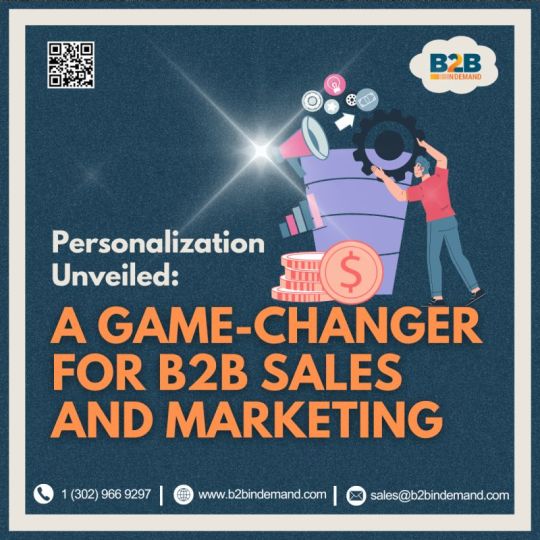
Introduction:
In the realm of B2B sales and marketing, personalization emerges as a pivotal element, heralding a new era of customer-centric strategies. Far from being a secret, personalization has become the cornerstone of success for businesses aiming to forge meaningful connections with their clientele. In today’s competitive landscape, understanding the nuances of personalization is not just advantageous; it’s essential for driving growth, nurturing relationships, and staying ahead of the curve.
Description:
Personalization in B2B sales and marketing transcends mere customization; it embodies a deep understanding of customer needs, preferences, and pain points. By leveraging data-driven insights and advanced analytics, B2B professionals can tailor their messaging, content, and offerings to resonate with the unique requirements of each prospect or client. From personalized email campaigns and targeted advertising to customized product recommendations and bespoke solutions, personalization empowers businesses to deliver unparalleled value and relevance at every touchpoint of the buyer’s journey.In the age of hyper-connectivity and information overload, generic, one-size-fits-all approaches no longer suffice. B2B buyers crave personalized experiences that speak directly to their challenges and aspirations. By infusing personalization into their sales and marketing efforts, businesses can foster deeper engagement, inspire trust, and differentiate themselves in crowded markets. Moreover, personalization allows organizations to anticipate customer needs, pre-empt objections, and guide prospects seamlessly through the purchase process, ultimately driving conversions and revenue growth.
Conclusion:
As we navigate the dynamic landscape of B2B sales and marketing, one thing remains abundantly clear: personalization reigns supreme as the not-so-secret ingredient for success. By prioritizing personalization strategies, B2B professionals can unlock untapped opportunities, cultivate long-lasting relationships, and position their brands as trusted advisors in the eyes of their audience. As we embrace the era of personalization, let us harness its transformative power to elevate customer experiences, drive business outcomes, and chart a course towards sustained growth and prosperity.
1 note
·
View note
Text

The Ultimate Guide to Building a Successful Lead Generation Pipeline"
Building a successful lead generation pipeline is crucial for any business looking to grow and thrive. A lead generation pipeline is a systematic process of identifying, attracting, and converting potential customers into qualified leads. In this guide, we’ll take you through the key steps to building a successful lead generation pipeline.
Define Your Ideal Customer Profile
Before you start building your lead generation pipeline, it’s important to define your ideal customer profile. This means identifying the characteristics of your target audience, including their demographics, interests, pain points, and buying behaviors. By understanding your ideal customer profile, you can tailor your messaging and marketing efforts to resonate with their needs and interests.
Create High-Quality Content
Your content is the foundation of your lead generation pipeline. Whether it’s blog posts, ebooks, whitepapers, or videos, your content should be informative, engaging, and valuable to your target audience. By providing high-quality content, you can build trust with potential customers and position yourself as an authority in your industry.
Develop Your Lead Magnet
A lead magnet is an incentive that you offer to potential customers in exchange for their contact information. Lead magnets can take many forms, such as ebooks, free trials, discounts, or exclusive content. To develop an effective lead magnet, it’s important to understand what motivates your target audience and what pain points they’re trying to solve.
Create Landing Pages
Landing pages are dedicated pages on your website designed to capture lead information. By directing traffic to a landing page with a clear call to action (CTA), you can increase the likelihood that visitors will convert into leads. To create an effective landing page, it’s important to have a clear and compelling headline, persuasive copy, and a prominent CTA.
Drive Traffic to Your Landing Pages
To generate leads, you need to drive traffic to your landing pages. There are many ways to do this, such as search engine optimization (SEO), social media marketing, paid advertising, email marketing, and content marketing. To determine the best channels for driving traffic to your landing pages, it’s important to understand where your target audience spends their time and what types of content they prefer.
Nurture Your Leads
Once you’ve generated leads, it’s important to nurture them with targeted messaging and relevant content. This can help build trust and keep your brand top of mind as potential customers move through the buying cycle. To nurture your leads effectively, it’s important to understand their pain points, challenges, and goals, and provide them with content that addresses these issues.
Use Marketing Automation
Marketing automation is a powerful tool for streamlining your lead generation pipeline. By automating repetitive tasks such as email campaigns, lead scoring, and lead nurturing, you can save time and improve the efficiency of your pipeline. Marketing automation can also help you personalize your messaging and improve the overall customer experience.
Measure Your Results
To optimize your lead generation pipeline, it’s important to measure your results and make data-driven decisions. By tracking metrics such as conversion rates, engagement rates, and cost per lead, you can identify areas for improvement and make adjustments to your strategy. It’s also important to track the ROI of your lead generation efforts and ensure that you’re generating a positive return on investment.
Continuously Refine Your Process
Finally, to achieve long-term success with lead generation, you need to continuously refine and improve your process. This means staying up to date with the latest trends and best practices, testing new strategies, and being open to feedback from your audience. By continuously refining your lead generation pipeline, you can generate more leads, improve your conversion rates, and achieve greater success in your industry.
In conclusion, building a successful lead generation pipeline requires a systematic approach that incorporates a range of tactics and strategies.
#promilo#b2bsolutions#b2b ecommerce platform#b2b demand generation#b2bleads#businesssolution#b2b portal#b2b#b2b saas#education#b2b content marketing
0 notes